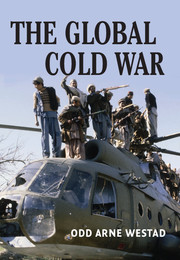Book contents
- Frontmatter
- Contents
- List of illustrations
- List of maps
- Acknowledgments
- List of abbreviations
- Introduction
- 1 The empire of liberty: American ideology and foreign interventions
- 2 The empire of justice: Soviet ideology and foreign interventions
- 3 The revolutionaries: anticolonial politics and transformations
- 4 Creating the Third World: the United States confronts revolution
- 5 The Cuban and Vietnamese challenges
- 6 The crisis of decolonization: Southern Africa
- 7 The prospects of socialism: Ethiopia and the Horn
- 8 The Islamist defiance: Iran and Afghanistan
- 9 The 1980s: the Reagan offensive
- 10 The Gorbachev withdrawal and the end of the Cold War
- Conclusion: Revolutions, interventions, and great power collapse
- Notes
- Index
Conclusion: Revolutions, interventions, and great power collapse
Published online by Cambridge University Press: 05 December 2012
- Frontmatter
- Contents
- List of illustrations
- List of maps
- Acknowledgments
- List of abbreviations
- Introduction
- 1 The empire of liberty: American ideology and foreign interventions
- 2 The empire of justice: Soviet ideology and foreign interventions
- 3 The revolutionaries: anticolonial politics and transformations
- 4 Creating the Third World: the United States confronts revolution
- 5 The Cuban and Vietnamese challenges
- 6 The crisis of decolonization: Southern Africa
- 7 The prospects of socialism: Ethiopia and the Horn
- 8 The Islamist defiance: Iran and Afghanistan
- 9 The 1980s: the Reagan offensive
- 10 The Gorbachev withdrawal and the end of the Cold War
- Conclusion: Revolutions, interventions, and great power collapse
- Notes
- Index
Summary
The Cold War is still generally assumed to have been a contest between two superpowers over military power and strategic control, mostly centered on Europe. This book, on the contrary, claims that the most important aspects of the Cold War were neither military nor strategic, nor Europe-centered, but connected to political and social development in the Third World. I have argued that while the dual processes of decolonization and Third World radicalization were not in themselves products of the Cold War, they were influenced by it in ways that became critically important and that formed a large part of the world as we know it today. Some of these influences were coincidental, while others were brought about through direct interventions. Together they formed a pattern that had disastrous consequences for today's relationship between the pan-European states and other parts of the world.
In an historical sense – and especially as seen from the South – the Cold War was a continuation of colonialism through slightly different means. As a process of conflict, it centered on control and domination, primarily in ideological terms. The methods of the superpowers and of their local allies were remarkably similar to those honed during the last phase of European colonialism: giant social and economic projects, bringing promises of modernity to their supporters and mostly death to their opponents or those who happened to get in the way of progress.
- Type
- Chapter
- Information
- The Global Cold WarThird World Interventions and the Making of Our Times, pp. 396 - 407Publisher: Cambridge University PressPrint publication year: 2005

